18.10.06
5.10.06
le Corbusier: architecte de bonheur 1957
So, I went to the pavillon de l'arsenal (again) (which by the way was recommended by Alessandra Cianchetta of AWP architects when she talked in London this summer otherwise I'd never have known) And they were showing this film tonight, with a debate afterwards concerning the portrait of the architect. I think in the UK it would have had a catchier title, something like, I don't know, architect:superstar?. It was a tiny room so I did what I always do: seek out the oldest man. The one with white hair and glasses and shirt tucked in and hairy ears. And then sit behind him. They always have the best conversation, these men.
And so, the film was predictably awesome: begins with Corb (can I call him that now?) painting in his studio. The floor is full of brushes leaking out of paint pots. It's messy. There's nothing golden about this situation, aside from the vacuous blonde/ 50s siren's hair. She's the one asking him questions throughout. Every time her face fills the screen is pure comedy and the entire room giggles. Maybe that's a bit cruel? Anyway so he takes her to a blackboard where he chalks out the essentials of living. We see a crudely drawn sun setting over the earth. It's important, light. And lots of tech drawings. And then to Marseille: sitting on the roof, sketching, children run towards le Corbusier with glee, for he is l'architecte de bonheur.
All this without a morcel of irony, wow! And unfortunately the organisers in the comfy chairs up front wanted to talk about mis-en-scene, and how cinema is vital for transmitting ideas of utopia, and the soundtrack, etc etc. They were starting to talk about le Corbusier's ideas and practice in relation to all this when the old guy in front of me got itchy and stood up to interrupt like all old men should and said: those drawings? I drew them! those models of the unite d'habitation? I made them! Those paintings he was painting? We painted together! If anyone here would like to ask me questions regarding le Corbusier, feel free to ask me. And then he sat down again.
At which point I really wished my french was a little better and the rest of the room weren't such cowards / snobs. There was an authoritative silence. The organisers followed this by saying: well, this talk is more about cinema than le Corbusier himself and then referred to his army of helpers and then spoke of his opportunism, at which point I tuned out and listened to the old man in front, who was busy reeling out the anecdotes concerning Corb's politics. It went something like Left! They were all left, everyone surrounding him. You know what he said to me? He said, heh, you're a communist. Just like me! And then he began mumbling, which is fine by me but kind of hard to arch your neck to. I wanted to stay longer and maybe hover around this old man next to the apperitif table, but unfortunately my companion had fallen asleep. And so ends this tale of getting it right: stalking OAPs at architecture talks. Should start a guide book.
And so, the film was predictably awesome: begins with Corb (can I call him that now?) painting in his studio. The floor is full of brushes leaking out of paint pots. It's messy. There's nothing golden about this situation, aside from the vacuous blonde/ 50s siren's hair. She's the one asking him questions throughout. Every time her face fills the screen is pure comedy and the entire room giggles. Maybe that's a bit cruel? Anyway so he takes her to a blackboard where he chalks out the essentials of living. We see a crudely drawn sun setting over the earth. It's important, light. And lots of tech drawings. And then to Marseille: sitting on the roof, sketching, children run towards le Corbusier with glee, for he is l'architecte de bonheur.
All this without a morcel of irony, wow! And unfortunately the organisers in the comfy chairs up front wanted to talk about mis-en-scene, and how cinema is vital for transmitting ideas of utopia, and the soundtrack, etc etc. They were starting to talk about le Corbusier's ideas and practice in relation to all this when the old guy in front of me got itchy and stood up to interrupt like all old men should and said: those drawings? I drew them! those models of the unite d'habitation? I made them! Those paintings he was painting? We painted together! If anyone here would like to ask me questions regarding le Corbusier, feel free to ask me. And then he sat down again.
At which point I really wished my french was a little better and the rest of the room weren't such cowards / snobs. There was an authoritative silence. The organisers followed this by saying: well, this talk is more about cinema than le Corbusier himself and then referred to his army of helpers and then spoke of his opportunism, at which point I tuned out and listened to the old man in front, who was busy reeling out the anecdotes concerning Corb's politics. It went something like Left! They were all left, everyone surrounding him. You know what he said to me? He said, heh, you're a communist. Just like me! And then he began mumbling, which is fine by me but kind of hard to arch your neck to. I wanted to stay longer and maybe hover around this old man next to the apperitif table, but unfortunately my companion had fallen asleep. And so ends this tale of getting it right: stalking OAPs at architecture talks. Should start a guide book.
Labels: architecture, france, paris, urbanism
2.10.06
pavillon de l'arsenal, videotheque, xenakis again.
The Pavillon de l'Arsenal is a gorgeous building. It's next to the Seine and has a statue recalling Rimbaud near its entrance, and a glass roof. On the ground floor is a story of Paris told through the changing public areas over hundreds of years. Descriptions of urbanity through models, drawings, diagrams, old footage and chronological statistics (daily feature of Parisian life)
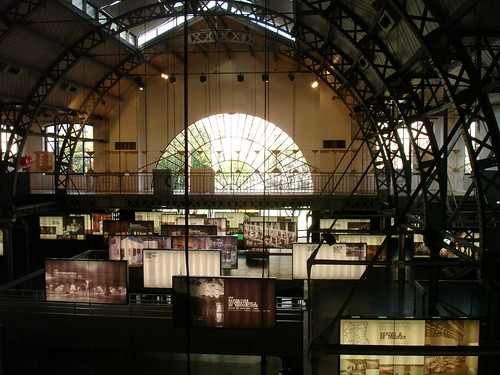
Upstairs is an exhibition of architects' exhibitions. Neatly summised in English and French, my favourite of the floating windows (imagine it is a desktop please) was Bruce Mau's pragmatic utopia generation: Too Perfect | Seven new Denmarks. Working in collaboration with Danish architects/designers, they tried reimagining the triple bottom line of economic, social, and ecological sustainability.
His letter "Dear Denmark" is ace. More countries should get open letters. Or maybe colour-coded diagrams. UK could get a myspace page.
Anyway, a few more steps and I was confronted by sticky red booths.
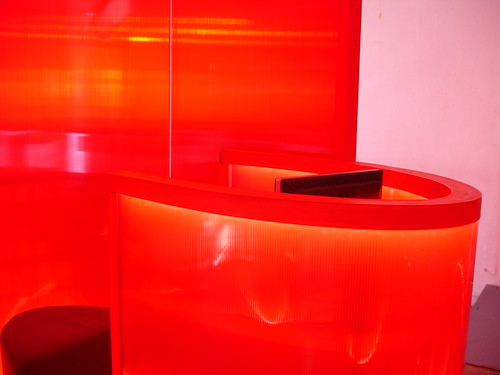
Videotheque! I am loving this word. Not only do they have short slapsticky films on the tramway of 1922 (don't ask) but also big-hitting long-players (Godard et al) and, Xenakis.
Xenakis talking about the U.P.I.C. on French TV to be exact:
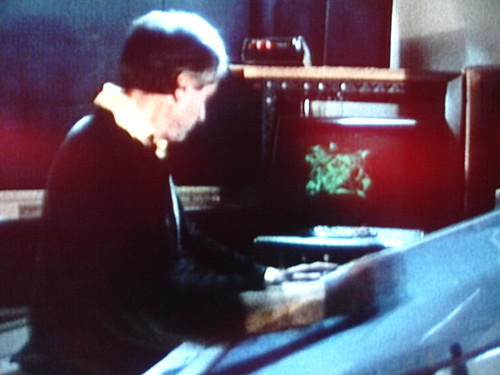
Up close:

This page describes the U.P.I.C system pretty well.
We had a voice over telling us he is a "classical greek man" (ha) and then the man himself talking about the genetics of sound, the demise of tradition, the necessity to invent nature, and lastly, how we must go further than nature. (Take note this film was only a few minutes long)
Apparently there is a Windows version of UPIC. Don't know what version Haswell + Hecker used for their project, but here's a section of the tale from Frieze:
Rather than concentrate on simple forms of mark-making and the sounds they produce, they experimented with different types of visual material – tracing onto the UPIC tablet images ranging from news photographs of disasters and atrocities, through depictions of the natural world to microscopic images of molecular structures (such as that which makes up 'the blackest ever black', a coating for telescopes that is purportedly the least reflective material on Earth). Despite the limitations of the system (it won't, for example, allow a full circle to be drawn – a sound that occurs over time can't, after all, travel back on itself), their research was in the spirit of stochastic exploration Xenakis advocated. Haswell and Hecker took the material they recorded at CCMIX and developed it for a diffusion system. No mere PA or surround sound set-up, a diffusion system is a multiple set of speakers that distribute sound through space, and allow for a high degree of real-time control over volume levels, equalization and, most importantly, spatial placement by the operator or performer at the mixing desk.
I want to visit the CCMIX quite badly.

Upstairs is an exhibition of architects' exhibitions. Neatly summised in English and French, my favourite of the floating windows (imagine it is a desktop please) was Bruce Mau's pragmatic utopia generation: Too Perfect | Seven new Denmarks. Working in collaboration with Danish architects/designers, they tried reimagining the triple bottom line of economic, social, and ecological sustainability.
His letter "Dear Denmark" is ace. More countries should get open letters. Or maybe colour-coded diagrams. UK could get a myspace page.
Anyway, a few more steps and I was confronted by sticky red booths.

Videotheque! I am loving this word. Not only do they have short slapsticky films on the tramway of 1922 (don't ask) but also big-hitting long-players (Godard et al) and, Xenakis.
Xenakis talking about the U.P.I.C. on French TV to be exact:

Up close:

This page describes the U.P.I.C system pretty well.
We had a voice over telling us he is a "classical greek man" (ha) and then the man himself talking about the genetics of sound, the demise of tradition, the necessity to invent nature, and lastly, how we must go further than nature. (Take note this film was only a few minutes long)
Apparently there is a Windows version of UPIC. Don't know what version Haswell + Hecker used for their project, but here's a section of the tale from Frieze:
Rather than concentrate on simple forms of mark-making and the sounds they produce, they experimented with different types of visual material – tracing onto the UPIC tablet images ranging from news photographs of disasters and atrocities, through depictions of the natural world to microscopic images of molecular structures (such as that which makes up 'the blackest ever black', a coating for telescopes that is purportedly the least reflective material on Earth). Despite the limitations of the system (it won't, for example, allow a full circle to be drawn – a sound that occurs over time can't, after all, travel back on itself), their research was in the spirit of stochastic exploration Xenakis advocated. Haswell and Hecker took the material they recorded at CCMIX and developed it for a diffusion system. No mere PA or surround sound set-up, a diffusion system is a multiple set of speakers that distribute sound through space, and allow for a high degree of real-time control over volume levels, equalization and, most importantly, spatial placement by the operator or performer at the mixing desk.
I want to visit the CCMIX quite badly.
Labels: architecture, france, paris, urbanism
27.9.06
les bobos.

French kids are obsessed by les bobos. It first entered my imagination as an appropriated description in the courtyard (petit bourges is less catchy) and is all over the press and look there's a quiz that reminds me of Killoffer (is it Killoffer?)
Now I'm listening to French radio every evening (can you feel my pain? what they taught us in school is correct: for every 3 english songs there are 2 french hybrids)
and I can tell you it's also a hit single by Renaud. (translation pending, use your franglais!)
12.9.06
School.
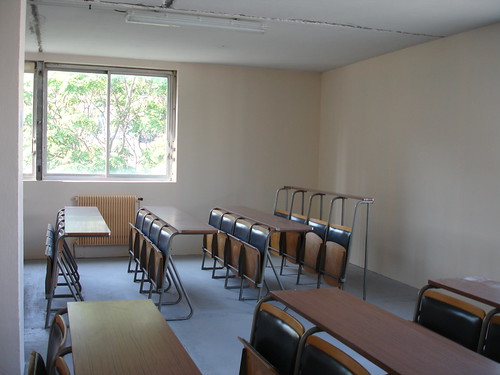
It's been a week and I haven't used my hands to make a single thing: I've been told the French like to analyse.
Have never, ever filled out so many questionnaires. Why do my teachers want to know my favourite dessert or what I think God will say to me when I meet him after I die?
I had to fill out 3 pages on typographie the other day. Suffice to say, the words leading and kerning do not exist in French.
Today I had my first philosophy class. We had yet another questionnaire to determine our knowledge.
I told her I'd read a little in my spare time, she called me a champion for mentioning Deleuze. Not sure if she was joking.
So here it is. I won't email it round in circles, but it made me laugh:
1) List in chronological order: Husserl, Kant, Plato, Nietzsche, Hegel, Merlau-Ponty, Epicure, Wittgenstein, Lucrece, Descartes.
2) What is a "symbol"?
3) Who said: "The beautiful is that which pleases universally without a concept." And what does it mean?
4) What is "sublimation"?
5) List the major works of: Balzac, Breton, Descartes, Tolstoy, Heidigger.
6) Who are: Jerome Basch, Jean Calvin, Boleo, Nicolas Malebranche?
7) Define the terms: idealism, materialism, empricism, impressionism.
8) Who said: "Common sense is judgement without reflection?"
9) What is a philosopher?
10) What is the allegory of the cavern?
11) What is the cogito?
12) What does "a priori" mean?
13) What is immanence and transcendence?
14) What is jansenism?
15) Who is Primo Levi?
16) What is the ineffable?
17) What is phenomology?
6.9.06
Paris en 8+ jours
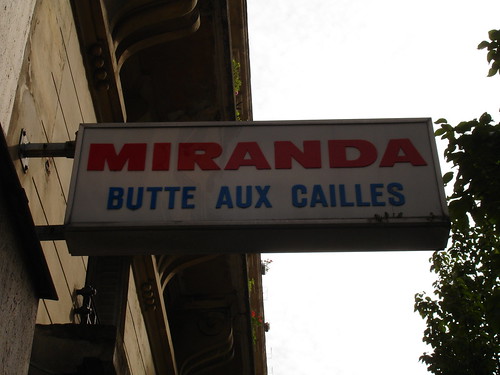
My neighbourhood. No, really
Wow this place slows me down. Which is nice. I've got this 1921 guidebook I picked up a few years ago, but it's more an artefact than anything. Haven't set foot in a museum or gallery for two weeks, let alone been to any of these places:
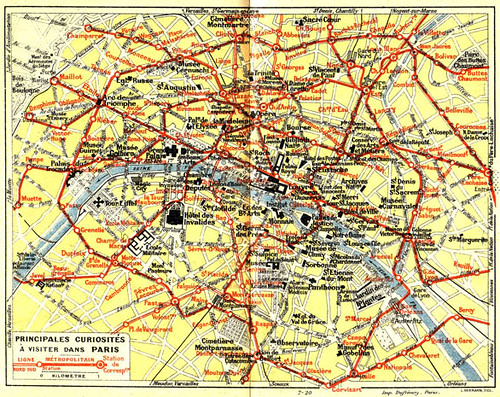
Regression is in: I revisited my youth on a boat on the Seine via JR Ewing. They are sturdier here, the boats I mean. The atmosphere was odd. Was convinced the support band were American, but they spoke perfect French in between songs. This is a growing trend: went to a small sweaty bar full of floppy fringed youth singing indie songs I didn't recognise in engleesh. All tight jeans and high heels. Some things never change.
Which brings me to: everyone smokes. Yeah I know, it's France. But they even encourage it at school: our directeur standing on a mini podium told us that "no institution can resist the reforms which are now happening globally. I understand the smoker's plight, and as there are 100 of you, maybe just 3 a day out in the courtyard." Que?
And as it's term time, I'm getting to grips with what's au courant here. They seem to scrutinise ads on the metro and organise events in chapels. The latter is described as: une nuit d'interactions visuelles, sonores, choregraphiques et humaines and has got L'Ensemble Creation Collective Ephemere doing a laptop-piano-voice improvisation to a short film. Hope I can take my mum.
Almost-Parisian David Fenech is playing too (check his song with James Plotkin and Stockhausen Remixed amongst others.) His audioblog David F Presents has introduced me to Ned Rothenberg's clarinets and is really great. Oh and ps I want this.




